What You Can Learn From Candidate Profile Pages
In preparation for your upcoming election, I encourage you to take advantage of an essential tool in your voting toolbox: the candidate profile page. Because so much goes into researching each candidate and giving you the information so you can see it for yourselves, this article may be a little longer than usual. However, the information is worth knowing in order to get as much value from your voter guide as possible.
I believe that every candidate we evaluate is applying for an incredibly important job—the opportunity to represent you. Their candidate profile in your voter guide is essentially their resume, and as their prospective boss, it is crucial for you to understand what each piece of information indicates about how they may perform their duties if you give them the job.
Each profile page, compiled by our researchers, presents the data that our volunteer panelists considered when they assigned that candidate’s rating. To get to the candidate profile page, click or tap the blue “more” button or on the candidate’s name when you see the list of candidates.
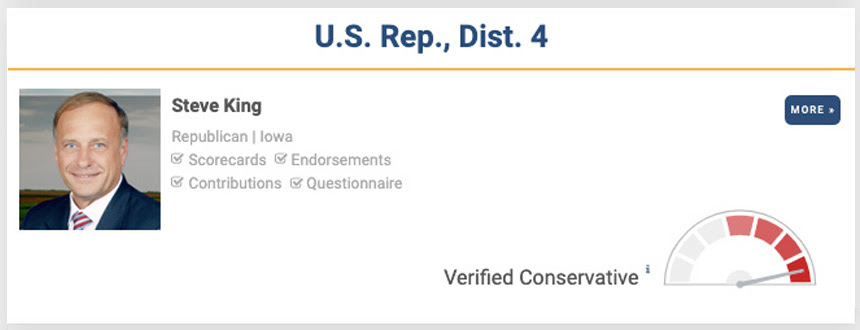
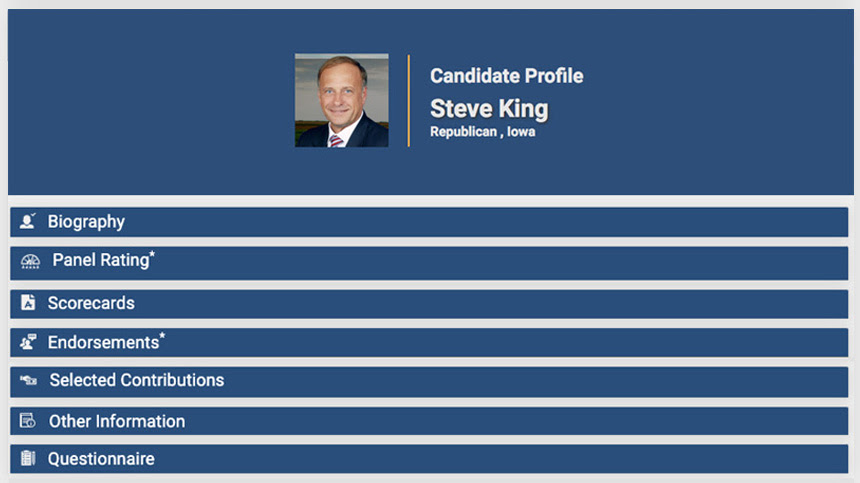
A candidate’s “resume” is a compilation of helpful categories of information: a Biography, Panel Rating, Legislative Scorecards, Endorsements, Financial Contributions, Other Important Information, and answers to our Questionnaire. Together, they can give you a picture of the candidate beyond their talking points.
Biography: Their Public Image
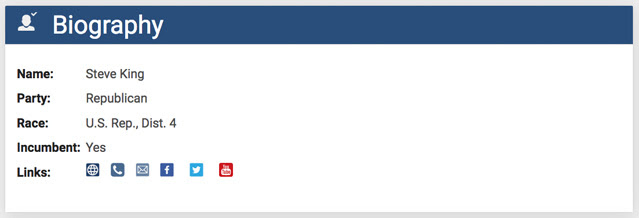
The candidate’s biography includes links to their website and social media pages when available. Following the links enables you to see how each candidate wants to present himself to the world. We also show you their political party affiliation and whether they are an incumbent (the current officeholder for that seat).
Most voters only have the time to glance at each candidate’s website and social media, but our panelists are able to take a deep dive before assigning a rating. Although not the most important piece of data—because we believe what a candidate does is just as important as what they say they’ll do—these public spaces sometimes contain the only information available on a candidate. Be assured that we go through them thoroughly.
When you go to the sites, take note of the amount and type of information available, as well as what’s missing. If a candidate fails to mention the issues most important to you, has that candidate earned your vote?
Panel Rating: Our Confidence Level

Before
publishing our guide, dedicated volunteer panelists review all of our research and synthesize the data into an
easily understandable descriptive label. The label (called a “rating” or “evaluation”) relays the confidence
level the panelists have on whether a candidate will vote conservatively or liberally if elected. You can learn
more about the work of our panelists here.
Our rating does NOT constitute an endorsement of the candidate! We want you to be able to make an informed decision, and this extra step of assigning a rating to each candidate’s political ideology is absolutely crucial to discovering how a candidate will likely govern if elected.
Further explanation of our rating definitions can be found here, and you can also learn more about our candidate evaluations.
Scorecards: Previous Employer References
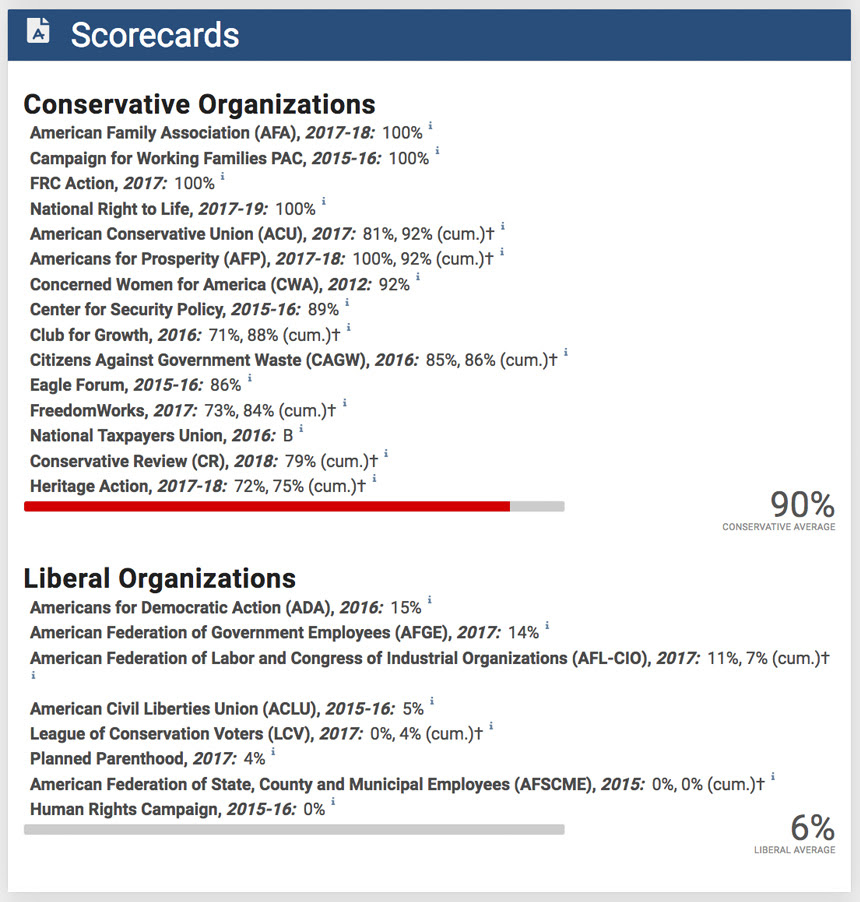
If the candidate has held a legislative office before, they will likely have scorecard data. A scorecard is a rating or grade assigned to an elected official by conservative and liberal organizations based on how that official voted on certain bills. Most organizations have specific issues on which they base their grade (e.g., abortion, 2nd Amendment, or fiscal policy). To find out each organization’s mission, click on the “i” next to their name, and a box with a description will appear:
We record the most recent ratings or grades from each organization. The year tells you when the rating was assigned to the candidate. Next to the year is the percentage or letter grade that the candidate received. Some grades, marked with “(cum)” and a cross-like symbol, represent a cumulative multi-year rating.
We consider scorecards to be very important when evaluating candidates, because it is evidence of a candidate’s actions in relation to the issues they profess to hold dear . . . and to their campaign promises. Without scorecard ratings, a candidate is not likely to receive a rating of Verified Conservative or Verified Liberal, unless they have taken strong, publicly verified action on behalf of such principles, often in spite of opposition.
Endorsements: Personal References

Most organizations consider an endorsement to be the strongest form of verbal support they can give a candidate. In this section, we only record official endorsements, not simply recommendations or generalized statements of support, though those may be disclosed by the candidate.
Endorsements are recorded from organizations and individuals who are either liberal or conservative. Endorsers who are not able to be classified either way are listed as “other” and typically do not affect a candidate’s rating.
No matter what is on a resume or how well individuals can represent themselves in an interview, it’s important to get information from those who know an applicant. Endorsements and contributions (below) tell you what others think about the candidate . . . and who is willing to align themselves publicly and invest in them.
Campaign Contributions: Their Values
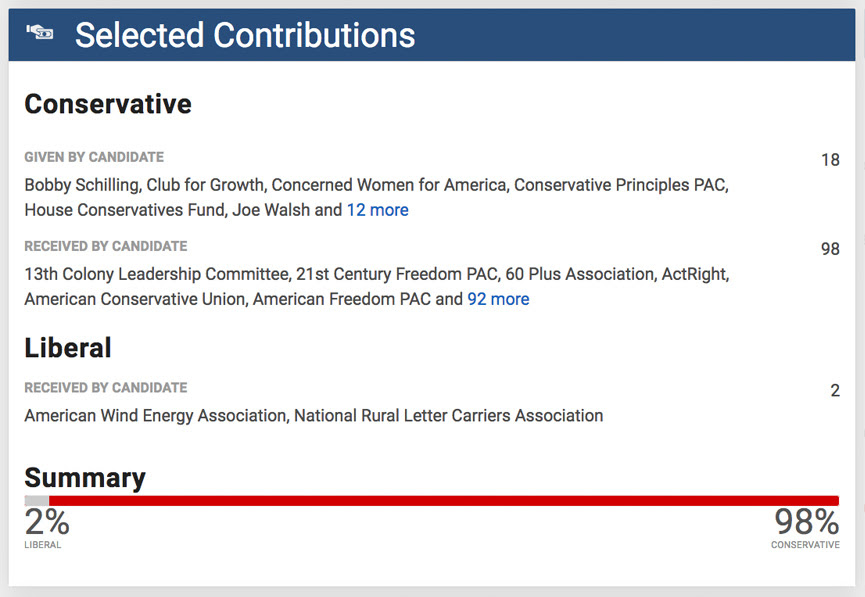
What a candidate does with money can reveal what is important to them, or who is trying to influence the way they will govern. We record two types of contributions:
- Donations given by the candidate to conservative, liberal, or other organizations, PACs, and individuals. These tell you what people and causes the candidate values enough to support and are sometimes more telling than donations received.
- Donations received by the candidate. These indicate who supports the candidate. They also may reveal to whom the candidate feels beholden and who may influence them once elected.
We summarize these contributions by calculating the percentage of the total number of conservative versus liberal donations.
As you can see, when we record an organization’s scorecards, contributions, or endorsements, we then determine—to the best of our ability—whether those entities are generally conservative, liberal, or other. We don’t just research the candidates; we also research the people to whom they are connected.
Other Information: Something to Note

Sometimes, we discover information that falls outside the other categories but may be helpful for the voter to know. For example, if the candidate is an officeholder, a recent vote on pivotal legislation that is not yet reflected on a legislative scorecard may be recorded here. We are careful to provide publicly verifiable sources for the material we include.
The bulk of research on judicial candidates is provided in this section, as is campaign finance documentation for local candidates such as school board. Our analysis of judicial and school board races includes information specific to each office as well as questions written especially for their positions. Learn more about our judicial ratings and our school board initiative.
Questionnaire: The Interview
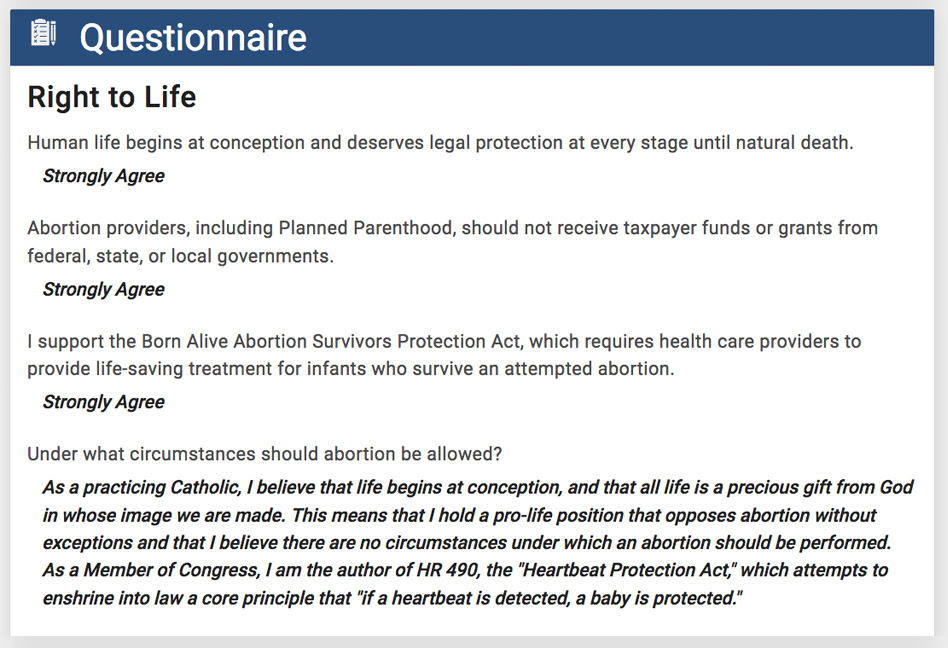
Finally, our questionnaire is the closest opportunity we can give you to interview the candidate. We have carefully crafted 35 in-depth questions on key areas of concern to Judeo-Christian voters. We ask the questions we think you would want to ask to get to the heart of candidates’ stances on important issues. The questionnaire also contains a section where the candidates can inform you of their work and life experience—or anything else they’d like to share with you, the voter.
If you would like to learn how our 2022 - 2023 questionnaire has been updated to address the issues you’ve told us are most important to you, I invite you to read this article.
Make the Most of the Information
Almost no one would hire an employee without reading a resume, checking references, and sitting down for an interview. Yet so many voters “hire” their next statesman sight-unseen, or don’t vote at all because they haven’t been informed on the candidates.
Proverbs 13:16 counsels, “Every prudent person acts with knowledge ... ” Our desire is to help you vote with knowledge. We spend an average of four hours of research per candidate so you can have the information at your fingertips and make an informed decision and vote with confidence.
Imagine the impact in your community if more voters were equipped with this knowledge! Please share this resource with at least one like-minded friend today and encourage them to be watching for their next voter guide.